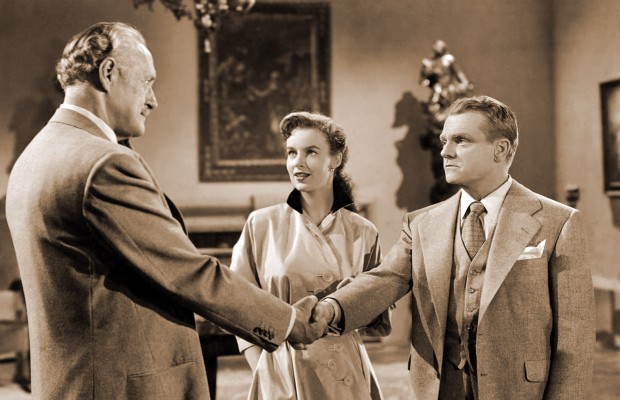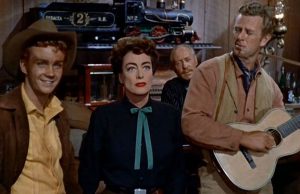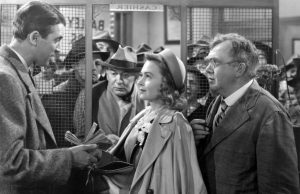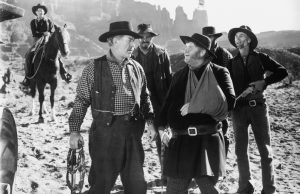Kiss Tomorrow Goodbye (1950)
By Toronto Film Society on October 20, 2014
Toronto Film Society presented Kiss Tomorrow Goodbye (1950) on Monday, January 20, 1975 in a double bill with All I Desire as part of the Season 27 Monday Evening Film Buff Series, Programme 3.
Production Company: A William Cagney Production. A Warner Brothers-First National Release. Director: Gordon Douglas. Producer: William Cagney. Script: Harry Brown, based on the novel “Kiss Tomorrow Goodbye” by Horace McCoy. Photography: Peverell Marley. Art Direction: Wiard Ihnen. Set Decroation: Joe Kish. Editing: Truman K. Wood, Walter Hannemann. Sound Recording: William Lynch. Musical Score: Carmen Dragon. Makeup: Otis Malcolm. Special Effects: Paul Eagler. Assistant Director: William Kissell.
Cast: James Cagney (Ralph Cotter), Barbara Payton (Holiday Carleton), Ward Bond (Inspector Charles Weber), Luther Adler (Keith Mandon), Helena Carter (Margaret Dobson), Steve Brodie (Jinx), Rhys Williams (Vic Mason), Barton MacLane (Lieutenant John Reece), Herbert Heyes (Ezra Dobson), Frank Reicher (Doc Green), John Litel (Tolgate), Dan Riss (District Attorney), John Halloran (Peter Cobbett), William Frawley (Byers), Robert Karnes (Detective Gray), Kenneth Tobey (Detective Fowler), Neville Brand (Carleton), William Cagney (Ralph’s Brother), George Spaulding (Judge), Mark Strong (Bailiff), Matt McHugh (Satterfield), Georgia Caine (Julia), King Donovan (Driver), Frank Wilcox (Doctor), Gordon Richards (Butler).
Gordon Douglas (b. in New York in 1909) began as a child actor in films at the age of three; then worked briefly for MGM and Paramount until he settled at the Hal Roach studios as an actor, gagman, assistant editor, assistant director and finally a director of shorts in the mid 1930s (including the “Our Gang” series). Since he directed his first feature in 1939 Douglas has averaged two films a year until the early 1970s–almost all of them programmers and easily forgettable. His finest films were: Kiss Tomorrow Goodbye, I Was a Communist for the FBI (1951), Come Fill the Cup (1951–also starring James Cagney), Them (1954) and Tony Rome (1967). Douglas could best be described as a competent craftsman who, though never able to manufacture greatness from his material, at least kept out of the way of it.
James Cagney (b. in New York, July 17, 1899) was the best gangster there ever was. His defiant dynamism and snarling sense of humour dominated all of his roles, but were most appropriate to the gangsters he played. Cagney’s development as a hood through the years accurately reflected the increasing complexity of the genre from the late twenties through the dirty, depression thirties, climaxing in the film noir gangster epics of the mid 1940s. By the time of White Heat (1949) and Kiss Tomorrow Goodbye Cagney had evolved into a psychotic criminal without peer.
All of the performances in Kiss Tomorrow Goodbye are solid. Cagney, of course, stands above the rest. William Frawley has a wonderful bit as a rasping prison guard. Rhys Williams is effective as a slyly reluctant crook. Most memorable are Bond and MacLane as two corrupt cops. These same two actors were merely shady detectives in 1941’s The Maltese Falcon, one of the earlier ‘black’ films. As the decade progressed, they were promoted, to inspector and lieutenant respectively, while all questions of their morality were settled.
Kiss Tomorrow Goodbye is one of the very blackest of films. Not one character has any redeeming social merits or elicits any audience sympathy. Police corruption, blackmail, payoffs, gambling, revenge and murder are but a few of the activities. Cagney has never been as physically brutal in a film–he particularly enjoys beating people who accuse him of insanity. The story, concerning Cagney’s attempts at getting ahead in crime after an opening jailbreak, is standard, though the format is varied a bit by having the participants relate the events in an after-the-fact Citizen Kane-manner.
Notes by Jaan Salk
You may also like...
-
News

Frances Blau
Toronto Film Society | February 27, 2024On Monday, February 26th, 2024, Toronto Film Society lost longtime friend, supporter, and board member Frances Blau. Known for her sense of humour, her love of film, her generosity,...
-
Special Events

Monday Evening Film Noir Double Bill at the Paradise Theatre
Toronto Film Society | July 8, 2024The Toronto Film Society presents a film-noir double feature at one low price! The Window (1949) in a double bill with Black Angel (1946) at the Paradise Theatre on Monday, August...
Programming

Virtual Saturday Night at the Movies
Toronto Film Society | July 20, 2024Toronto Film Society is back in the theatre! However, we’re still pleased to continue to bring you films straight to your home! Beginning Season 73 until now we have...
4-
 Toronto Film Society | July 8, 2024
Toronto Film Society | July 8, 2024
Monday Evening Film Noir Double Bill at the Paradise Theatre
-
 Toronto Film Society | November 6, 2022
Toronto Film Society | November 6, 2022
-
 Toronto Film Society | August 1, 2023
Toronto Film Society | August 1, 2023
Donate to Toronto Film Society – We’re now a Registered Charity!
-
Copyright © 2017 Toronto Film Society.








Leave a Reply